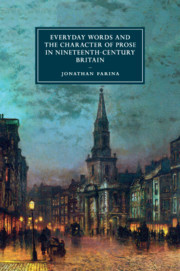Description
Everyday Words and the Character of Prose in Nineteenth-Century Britain
Cambridge Studies in Nineteenth-Century Literature and Culture Series
Author: Farina Jonathan
This book explores the ordinary turns of phrase by which major nineteenth-century British writers created character.
Language: EnglishApproximative price 28.98 €
In Print (Delivery period: 14 days).
Add to cart
Everyday Words and the Character of Prose in Nineteenth-Century Britain
Publication date: 02-2019
Support: Print on demand
Publication date: 02-2019
Support: Print on demand
Approximative price 81.47 €
In Print (Delivery period: 14 days).
Add to cart
Everyday Words and the Character of Prose in Nineteenth-Century Britain
Publication date: 09-2017
Support: Print on demand
Publication date: 09-2017
Support: Print on demand
Description
/li>Contents
/li>Biography
/li>
Everyday Words and the Character of Prose in Nineteenth-Century Britain is an original and innovative study of the stylistic tics of canonical novelists including Austen, Dickens, Trollope, Thackeray and Eliot. Jonathan Farina shows how ordinary locutions such as 'a decided turn', 'as if' and 'that sort of thing' condense nineteenth-century manners, tacit aesthetics and assumptions about what counts as knowledge. Writers recognized these recurrent 'everyday words' as signatures of 'character'. Attending to them reveals how many of the fundamental forms of characterizing fictional characters also turn out to be forms of characterizing objects, natural phenomena and inanimate, abstract things, such as physical laws, the economy and legal practice. Ultimately, this book revises what 'character' meant to nineteenth-century Britons by respecting the overlapping, transdisciplinary connotations of the category.
Acknowledgements; Abbreviations; Epigraphs; 1. Darwin's view from Todgers's: 'A decided turn' for character and common words; 2. Inductive 'attentions': Jane Austen in 'particular' and in 'general'; 3. 'Our skeptical as if': conditional analogy and the comportment of Victorian prose; 4. 'Something' in the way realism moves: Middlemarch and oblique character references; 5. 'Whoever explains a 'but'': tact and friction in Trollope's reparative fiction; Afterword; Notes; Bibliography; Index.
Jonathan Farina is Associate Professor of Nineteenth-Century British Literature at Seton Hall University, New Jersey, where he is Director of the Center for Literature and the Public Sphere, and an Associate Director of the Honors Program. He is Associate Editor of The Wordsworth Circle.
© 2024 LAVOISIER S.A.S.





